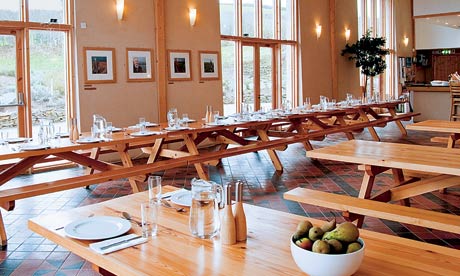
The Field Kitchen, Riverford Farm, Buckfastleigh, Devon 01803 762 074. Dinner for two, including wine and service, £70
Have you ever lifted an organic veg box and wondered why it was so damn heavy? It's because it is weighed down by the hopes, fears and aspirations of the entirety of Britain's guilt-sodden middle classes. That and the cannonball-like swede that always seems to end up in there. I cannot understand why a serious cook would allow a random collection of ingredients into the house, and hate the smug satisfaction that those who order them exude. They think they are doing something to save the planet. They aren't. They are making affluent lifestyle choices and supporting apparently alternative business – but ones built entirely on conventional marketing strategies.'
I thought all this before I visited the headquarters of Riverford Farm, and I still hold some of those views. But even I was impressed by the heft of Guy Watson's operation as we toured the fields. We ate Little Gem lettuces straight from the red-clayed Devon earth and rubbed fennel tops until our fingers smelled of anise. Riverford – with its five farms in Britain and its new outpost in France – is, I think, the progressive face of ethical business. It's gone large scale without much in the way of compromise and created a robust economic model. It will never offer a serious answer to the very real food security questions we face, but it can inspire debate while satisfying the desire for lots of luscious green stuff.
Plus it's home to a bloody good restaurant. The Field Kitchen, located in an airy, purpose-built terracotta wave of a building, daily receives vegetables straight out of the surrounding fields. Now obviously, if Guy Watson was showing me around, my arrival was hardly a surprise. So for the sake of clarity, this should be regarded less as a review and more of an account of a very nice evening out.
The food – one multi-dish set menu served to the whole room, the dishes plonked family-style on to each table – comes from a kitchen overseen by the remarkable Jane Baxter. Here, the classic European model – animal protein at the centre, vegetables as side dishes – is reversed. Meat and fish are not the focus and at times become little more than add-ons. Of the antipasti, for example, it is their roasted asparagus smeared with goat's cheese that sticks in the memory, or the lightly dressed ribbons of still-crunchy cucumber with dill alongside flakes of Loch Duart salmon that they had hot-smoked themselves. There were also smoked haddock beignets, still hot from the deep-fat fryer so that they rustled in the bowl and made me mutter shameful things under my breath like: "Ooh, light as a feather."
The main course brought bowls of their new potatoes baked inside paper bags with wet garlic, braised carrots, turnips and kohlrabi that tasted more of themselves than could ever be decent, braised summer greens with wet and wild garlic which threw up layers of brassic and bitter and aromatic, seasoned with Parmesan, and a dark, crusted gratin of fennel and chard which had us scraping around the outside of the dish with the spoon. Oh, and there was some pot-roast guinea fowl.
They finished by laying out half a dozen cakes and puddings, among them a mango pavlova, a trifle mined with their own rhubarb, a baked custard and a sticky toffee pudding, made to the great Joyce Molyneux's recipe, which was shockingly light.
And all this for £17.50 at lunch, £22 at dinner. It points up the economic advantage of a vegetable-dominated diet and would probably leave you with enough spare cash to afford one of their veg boxes, were you that sort of person. Which, for what it's worth, I still am not. But that doesn't stop me being impressed. Which, for what it's worth, I am.
Email Jay at jay.rayner@observer.co.uk or visit theguardian.com/profile/jayrayner for all his reviews in one place

